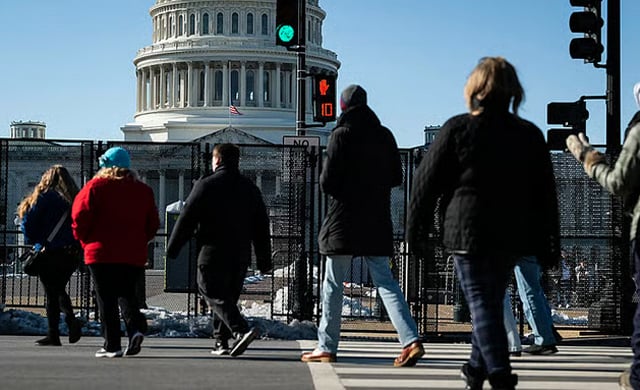News Flash
News Flash

WASHINGTON, Nov 14, 2025 (BSS/AFP) - Roads and sidewalks in the US capital Washington were again clogged as thousands of federal employees returned to work Thursday following the record-breaking government shutdown -- but some, like management analyst Lee Hardwick, never left.
Hardwick had to work the entire 43-day shutdown -- unpaid.
"I'm pleased that my colleagues, the ones who haven't gotten paid, or the ones who haven't been working, that they actually at least get to come back to work," the 62-year-old told AFP.
The shutdown -- a uniquely American phenomenon that happens when Congress cannot agree on a budget -- impacted more than a million government employees.
Those deemed essential, such as air traffic controllers, kept working. The others were furloughed and left waiting for news.
After 43 days, the waiting came to an end Wednesday, when President Donald Trump signed a bill funding the government through January -- the result of a deal brokered by Republicans and a handful of moderate Democratic lawmakers.
Many federal workers approached by AFP declined to be interviewed, a reflection of the political tension behind the shutdown.
"It was stressful as it relates to the unknowing" of what was going to happen, Hardwick said of the shutdown, adding that people were "annoyed and frustrated" by the impasse.
Scenes of federal employees waiting for food handouts in the Washington suburbs showcased the hardships some faced while on furlough, their incomes slashed to zero.
- 'Lesson learned'? -
Things began to get back on track Thursday, with air traffic returning to normal levels after shortages of controllers forced thousands of flights to be delayed or cancelled.
Museums in Washington, many of which closed during the shutdown, are set to reopen on Friday.
"I felt bad for my other colleagues and friends at other agencies," said Steve, a government worker in his 50s who asked to use a pseudonym.
One federal worker at the Office of Personnel Management, who requested anonymity, said they had to work throughout the shutdown.
"It was a little sad to see all my federal comrades not being able to come to work, and then taking the bus for some of them that had to come to work and not get paid. It was sad," the worker told AFP.
"There's an African proverb that says: 'When the elephants fight, it's the grass that suffers,'" the employee said.
"And I think that both (political) parties bear some responsibility, because we, as the grass, suffered during that argument."
Though the bill funded the US government through January 30, another possible shutdown is possible in 2026.
"Hopefully...this was a lesson learned, and I'm hoping that even if it happens in January, that it would be a short one," said Hardwick.
"Hope it won't happen again."